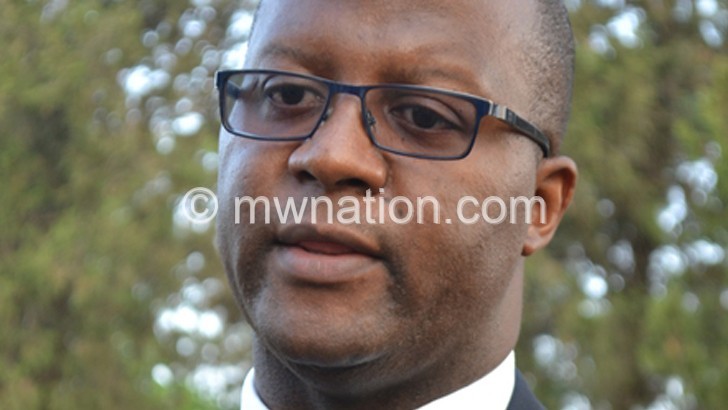Minister clarifies on Land Bills
Last week, Parliament passed the controversial land bills amid protests from the opposition bench who mainly raised concerns that the bill would put poor land owners at a disadvantage. In this interview, EPHRAIM NYONDO seeks clarification on the contentious bills from Minister of Lands, Housing and Urban Development ATUPELE MULUZI.
Q: Clearly, the passing of the Land Bill No. 2 of 2016 in Parliament has brought about controversy across the country. Let us begin with the manner in which this happened in the Chamber. Are you comfortable that the Bill was passed even after opposition members of Parliament (MPS) had walked out in protest?
A: Parliament passed four land-related bills namely: Land Bill, Physical Planning Bill, Land Survey Bill and Customary Land Bill. These are some of the most complex changes to legislation that Malawi has ever made.
The bills were first read in Parliament in March and referred to four Parliamentary Committees for further scrutiny. The committees presented their joint reports containing their recommendations and findings to the House for consideration.
One of the recommendations by the joint committees was that we should abolish freehold land. The approved law has a provision that there should be no more granting of freehold land in Malawi once the Bill has been assented to.
The bone of contention is where the opposition wanted to insert a clause saying that the law should apply retrospectively and that the current holders of freehold land should lose their freehold title and it should automatically convert to leasehold title.

Government had a problem with this proposal. Firstly, Section 209 (1) of the Constitution provides for the continuation of rights of persons in property. It was our opinion that what was being proposed by the opposition would not be in conformity with this provision in our Constitution and thus we needed to move cautiously on this matter.
Secondly, Section 5 of the Constitution provides for Supremacy of the Constitution over any other law and invalidates any law which is inconsistent with it. Government was insistent that we uphold the provisions of our Constitution.
Thirdly, Section 44 (4) provides that there must be appropriate compensation paid out where there is expropriation.
The House was advised to take into consideration all these issues before enacting such a provision. Less than three percent of the land in the country is under freehold title. Not all of the freehold land is in the hands of foreign companies or organisations. Malawians, too, hold freehold land.
Government position is that we should, as a country, no longer grant new freehold title. Existing freehold title should not be tampered with until further consultation, as it would send the wrong message to investors.
However, the Land Bill has provided for the surrender and acquisition of non-developed freehold land under Section 39 of the Land Bill. The Physical Planning Bill has also given powers to the Minister responsible to issue a Vacant Land Development Order to have the land leased out by government.
All of the provisions just mentioned, including provisions contained in the Lands Acquisitions (Amendment) Act yet to be debated by Parliament have adequately provided mechanisms for how government can acquire or posses land to be given to people that are landless.
What the opposition was proposing was not in tandem with current existing government policy and when they did not get their way, they left the Chamber in protest.
Q: We understand that you actually triggered those protests when you “ambushed” committees, which had made proposed amendments to the Bill with your earlier encouragement, after a March 23 reading of the Bill in the House had attracted opposition queries. On Sunday, July 3, you reportedly met the committees tasked to look at the Bill and you encouraged them to amend it to their taste. But when you read the Bill, finally, in the House, on July 12, you read the old Bill that had not been amended. Why was there the alleged ambush, or was there such a thing?
A: Nonsense! These Bills were referred to four parliamentary committees in March of this year for further scrutiny and recommendation to Parliament once they are ready with their findings.
Once Bills are referred to Parliamentary Committees the Bills are no longer in the hands of the Executive branch of government. We do not interfere unless called upon or summoned to clarify a matter. We do not tell them what to do. Parliament is independent. The committees are supposed to hold public hearings [and the like] and present their joint report with findings and recommendations to Parliament.
Thereafter, it is up to the house to agree or disagree with the proposals and recommendations in the report. In this particular case, there were proposed amendments. Some were agreed to by the house some were not agreed to. In a democracy sometimes you have to agree to disagree, accept and move on!
Q: Obviously, emotions cloud discussions over the Land Bill. In your view, which are the issues where the government and the opposition argue fervently about over customary land and freehold matters?
A: I have explained the issue of freehold land. There is a difference between customary land and customary estate.
Customary land is defined as land held, used or occupied by the people communally, meaning that the land is not individually or privately owned. In its current status, customary land cannot be used as security to obtain a loan from the bank. When government is acquiring such land for public use, compensation is not paid for the land itself because it is considered as having no value.
With the passing of the Land Bill and the Customary Land Bill, individuals in the local community will now have an opportunity to seek permission from the Traditional Authority of the area to register this land. This means that they can now be recognized as the private owners of the land.
This will mean that individuals will then be able to use this land as security for obtaining a loan from the bank. The owner will also be able to lease or sublease their land or transfer ownership through their will or transmission. Another key change is that young people and women can also be registered as owners of the land in their own right, meaning that widows can now have security.
These changes will all come into force once the Registered Land (Amendment) Bill, 2016 has been enacted, which will be later this year. The respective land committees and the Traditional Authorities shall only affect such registration after the approval of the application. Group village heads and traditional authorities will chair these land committees.
The cost of initial registration of customary estates will be completed and will be covered by government. However, subsequent transactional costs will then need to be met by the landowners. These transactions will include the registration fees for the transfer of the customary estates, leases and subleases. These fees should be payable by the person who is buying the customary estate. The owner of the customary estate will also be requested to pay fees for the sub division of any land. The owners will also be liable for any capital gains tax that results from these transactions.
Q: When you say people owning customary land will now be required to pay a one-off registration fee, just how much will this be and what will be the terms?
A: That Section (27) of the Bill does not apply to customary land holders. It is only applicable as a condition of granting a customary estate. I have just explained the difference. The conditions under Section 27 (2) (c) will only apply when the titleholder of a customary estate decides to transact on the land. For example, lease it out; obtain a loan, sub-divide, inheritance, transfer, sale, and so on.
Q: This move has apparently angered traditional leaders, who say the new law will usurp their powers over land and ordinary Malawians are alarmed that they now have to pay for land they freely inherited from their forefathers. Do you intend to implement the changes, nonetheless?
A: This is not what is contained in the new law. These reactions are there perhaps in reaction to what is being misrepresented and advanced in the media.
Q: Some people are accusing the government of protecting and favoring foreigners more than the ordinary Malawians in the Land Bill, particularly because the foreigners will not have to pay registration fees and taxes. May you state where, and how, foreigners will be pinned to pay their due taxes and fees?
A: Similar conditions currently apply to all transactions on freehold land and leasehold land in the country, irrespective of whether you are a foreigner or Malawian. Section 20 of our Constitution does not discriminate.
These conditions will not apply to public land i.e., Land Belonging to Government as well as Un-allocated Customary Land (Customary Land which has not been registered to an individual). However foreigners wishing to transact on Customary Land will be subjected to the provisions under Sections 24 to 27 of the Customary Land Act.
Q: It is also alleged that some foreigners are increasingly setting up ‘land-securing’ factories and other businesses in rural areas suspected to have mineral deposit sites. Are you aware of this and could we say the aerial mapping that was done, to ascertain mineral deposit sites in the country, is being radically taken advantage of by foreigners in this way?
A: All Minerals belong to the State (Republic). The owners of land will not own the minerals on that land.
Q: Given these, and other, controversial issues over the Land Bill, one senior politician, Umodzi Party President, Professor John Chisi, is saying President Peter Mutharika should not assent to the Land Bill until it has been subjected to a nationwide public debate, or a referendum, to ensure that ordinary Malawians are not short-changed over land matters. How do you react to this?
A: These Land Bills have been with us and debated for the past 14 years. Emanating from the Law Commission on land reform that led to the formulation of the 2002 Land Policy. These Bills reflect what is contained in the Land Policy. I am not aware of any legislation in Malawi’s history that has undergone such rigorous consultation and debate. There have been several versions of the Bills. The current version had to take to into account concerns from various stakeholders after the Bills were first presented to Parliament in 2012 and not assented to by the then President.
Perhaps his comments are based on a previous version of the Bills? I am not sure, because certainly what he is advancing is not what is contained in the Bills we have just passed at Parliament.
Q: If not well handled, land issues have proved to be divisive and bloody in other countries, including our neighbours. How do propose that push should not come to shove over these emotive issues?
A: They are indeed sensitive! That is why I appeal to all leaders not to politicise or misrepresent issues of land especially as it relates to the Bills that recently passed in Parliament. It is much better to read the proposed law, understand it and then make comments. If in doubt my Ministry is ready to provide clarity where necessary.
An implementation strategy was developed that includes mass civic education to ensure that there is greater understanding and no more misrepresentations on the matter. It will begin with chiefs in the next few weeks.
With changes in law and access to new technologies, we are now in a period of review such that we can ensure that these reforms are implemented in the most efficient ways possible. This includes taking lessons from other countries that have gone through this process.
The strategy includes the establishment of an Inter-ministerial Steering Committee comprising all relevant ministries. The Ministry of Land, Housing and Urban Development has also established a Land Reform Implementation Unit comprising the Policy Planning Unit and senior technical officers from the Departments of Lands, Physical Planning and Surveys. We have also established a sector-working group on Land Governance comprising members of government, civil society and supporting partners to oversee the implementation of the land reforms and ensure that all stakeholders have an opportunity to support the implementation strategy.





